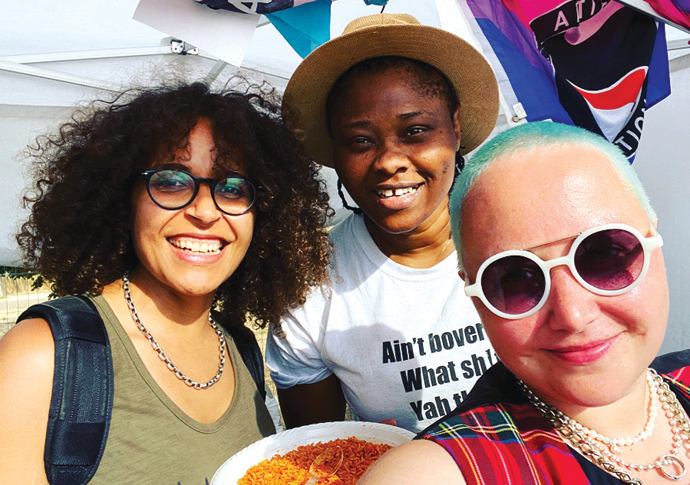‘Hateful language can lead to homelessness’
Outside Project set to open their first permanent LGBT+ shelter
Friday, 3rd February 2023 — By Izzy Rowley

From left: Laik Ecola, Hilda and Carla Ecola
THE co-founder of an outreach organisation is calling for people to understand that hateful words can lead to homelessness.
The Outside Project previously used the former Clerkenwell Fire Station on a temporary basis, but are now due to open their first permanent LGBT+ homelessness shelter in Islington later this month.
“People need to realise that when they share hateful content online their queer friends and family see it, and it can lead to homelessness,” said Carla Ecola, who uses they/them pronouns, and is the co-founder and managing director of The Outside Project.
“For some people, as soon as their family learn they’re queer or trans, they have to leave the house for their own safety – it’s either domestic abuse, the torture that is so-called ‘conversion therapy,’ and some people are even being trafficked out of the country for conversion therapy.”
They added: “I can’t tell you exactly where the new shelter is in Islington because it’s a protected address. But, it’s a house with the proper amenities to run a homelessness service. With the other venues we’ve been in we had to be inventive with using the space. I was really grateful for those venues, but the progression to what we have now is fantastic.”
Ecola and colleagues co-founded The Outside Project when they saw, through experience, that homelessness services were “ineffective for marginalised communities”.
“Particularly with our trans community, they feel safer coming to stay with us rather than mainstream shelters where they experience transphobia,” Ecola said.
“A lot of our trans community hide the fact that they’re trans when they’re on the street. But that has a huge impact on their mental health, and their access to services as well.”
Being shamed, bullied, or abused for their identity means queer people lose their social network or feel afraid to return to their families and therefore face the risk of homelessness.
“A lot of LGBTQ+ people will move to areas of the country where there’s a higher queer population so they have that connection with the community.
“But, they often move without having much of a plan, or social foundations in that area.”
Ecola is advocating for broader inclusivity in homelessness services in general.
“We get so many people who initially don’t want to come to us because they feel they aren’t ‘homeless enough’ to access a homelessness shelter,” they said.
“They hadn’t lost all of their clothes, or they had some kind of job, or friends, or they weren’t hooked on drugs.
“The stereotypes of homelessness create a barrier for people accessing homelessness shelters.
“The marketing by big homelessness organisations, the way they show the haggard old boy rough sleeper, all of those marketing campaigns create barriers for people like us accessing homelessness services.
“That’s why we campaign in a different way. You’ll never see us interview someone looking really sad and telling their tragic life story – it’s massively exploitative, and it’s re-traumatising as well.
“When I was thinking about why I didn’t look at homelessness services when I was in trouble, that’s why: the campaigns didn’t tell my story, and if they did, it felt exploitative.
“The way we market the Outside Project is through fun events and stuff we’re doing – it’s an effort get people to come down and join the football team, come to our ‘Cafe Queero’ coffee hour, do tai chi, and talk to us about their housing situation.”
• Anyone who needs access to the Islington shelter, or other LGBT+ homelessness services, can go to www.lgbtiqoutside.org for more information.